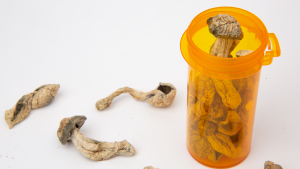It could be a drug company that’s got a treatment for mental health that’s working for patients. Another possibility is operators of mental health facilities. However, it would be false to say that I’ve spent much time researching stocks in this niche area, so I’m relatively unaware of the possibilities.
AdvisorShares launched the AdvisorShares Psychedelics ETF (NYSEARCA:PSIL) in September 2021. The shares could have done better, losing 85% of their value, trading around $1.50. PSIL invests in the emerging psychedelic drugs sector.
As someone who supports the Law Enforcement Action Partnership, which focuses on moving beyond the war on drugs, I believe ETFs like PSIL are vital to supporting companies that are working to reduce the damage caused by addiction and poor mental health.
Unfortunately, PSIL hasn’t met a better fate, but investing is about profits, not losses.
On the plus side, the holdings from PSIL gave me one of my three mental health stocks to buy to help change the world.
Bristol Myers Squibb (BMY)

Bristol Myers Squibb (NYSE:BMY) is the biggest of the three stocks.
In December, it announced the acquisition of Karuna Therapeutics (NASDAQ:KRTX) for $14.0 billion, or $12.7 billion after cash. The $330 price per share is a 53% premium to Karuna’s share price on Dec. 21, 2023.
Karuna is focused exclusively on developing medicines for people living with psychiatric and neurological conditions. The company’s KarXT New Drug Application (NDA) for treating schizophrenia in adults was accepted by the Food and Drug Administration (FDA) for review by September 2024.
As Bristol Myers press release states, KarXT is in registrational trials both for adjunctive therapy to the existing standard of care agents in schizophrenia and for the treatment of psychosis in patients with Alzheimer’s disease.
Bristol Myers is accelerating its participation in neuroscience. The acquisition of Karuna and KarXT should contribute significantly to the company’s revenue growth in the second half of the 2020s and into the 2030s. Bristol Myers CEO Christopher Boerner stated:
“This transaction fits squarely within our business development priorities of pursuing assets that are strategically aligned, scientifically sound, financially attractive, and have the potential to address areas of significant unmet medical need.”
Acadia Healthcare (ACHC)

Acadia Healthcare (NASDAQ:ACHC) was founded in Jan. 2005 in Franklin, TN. It provides psychiatric and chemical dependency services to its patients through inpatient psychiatric hospitals, specialty treatment facilities, residential treatment centers, outpatient clinics and therapeutic school-based programs.
The company operates 253 behavioral healthcare facilities with approximately 11,100 beds in 39 states and Puerto Rico. It is the largest behavioral health-focused provider in the country, treating roughly 75,000 people per day.
Approximately 51% of its $2.9 billion in trailing 12-month income through Sept. 30, 2023, is for acute care, followed by specialty (21%), comprehensive treatment centers (17%), and residential treatment centers (11%).
Its plan is three-fold: 1) grow the number of facilities through joint ventures and new builds, 2) expand its level of care for substance abuse disorders, and 3) leverage technology to improve patient care.
As U.S. Surgeon General Dr. Vivek Murthy pointed out in 2023, “Mental health is the defining public health crisis of our time.”
The company currently has 31 existing joint venture partnerships to accelerate facility growth.
Through Sept. 30, it had trailing 12-month adjusted EBITDA (earnings before interest, taxes, depreciation and amortization) of $650 million, good for a 22.4% EBITDA margin.
I’m very intrigued by Acadia’s business.
Compass Pathways (CMPS)

Compass Pathways (NASDAQ:CMPS) is the smallest of three mental health stocks with a market capitalization of $629 million. Its first major treatment is the use of COMP360 psilocybin, the hallucinogenic chemical obtained from certain types of mushrooms, for people with treatment-resistant depression.
In December, the company announced that its phase 2 study of its investigational COMP360 psilocybin treatment was well received by people who have PTSD (post-traumatic stress disorder). There were no severe adverse effects on the 22 participants. Dr. Guy Goodwin, Chief Medical Officer, Compass Pathways, said:
“Safety is of paramount importance when developing potential new treatments, so we are pleased to see these positive safety signals. These results are consistent with findings from other studies and add to the growing body of evidence to demonstrate the potential of COMP360 in difficult-to-treat mental health conditions.”
The company’s phase 3 trial is underway, with results expected in the summer and more by the middle of 2025.
Like most early-stage biotech firms, there are many expenses and no revenue. Compass is no different. Through the first nine months of 2023, it lost $98.5 million, about $20.3 million higher than a year earlier.
To keep the coffers full, it did a private placement in August that raised $125 million. If exercised, the warrants accompanying the American Depositary Shares (ADSs) would bring in an additional $160 million. With an exercise price of $9.93, the warrants are already in the money.
CMPS is the riskiest of the three. However, the potential reward is also relatively high if you’re an aggressive investor.
On the date of publication, Will Ashworth did not have (either directly or indirectly) any positions in the securities mentioned in this article. The opinions expressed in this article are those of the writer, subject to the InvestorPlace.com Publishing Guidelines.
Will Ashworth has written about investments full-time since 2008. Publications where he’s appeared include InvestorPlace, The Motley Fool Canada, Investopedia, Kiplinger, and several others in both the U.S. and Canada. He particularly enjoys creating model portfolios that stand the test of time. He lives in Halifax, Nova Scotia.
